人教版高中英语必修四 unit4Body Language---Using Language(共45张PPT)
文档属性
| 名称 | 人教版高中英语必修四 unit4Body Language---Using Language(共45张PPT) |
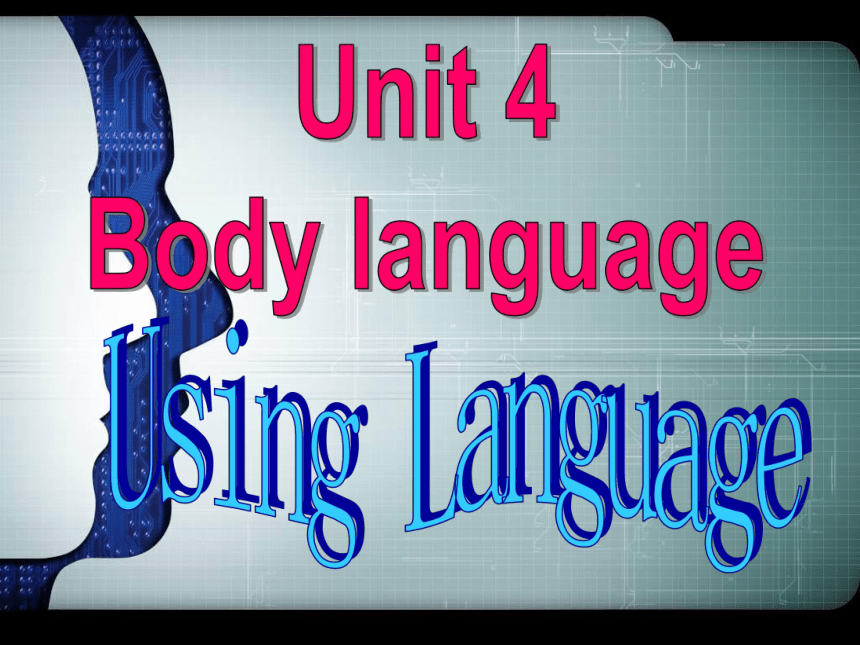
|
|
| 格式 | ppt | ||
| 文件大小 | 1.7MB | ||
| 资源类型 | 教案 | ||
| 版本资源 | 人教版(新课程标准) | ||
| 科目 | 英语 | ||
| 更新时间 | 2020-11-15 17:54:54 | ||
图片预览


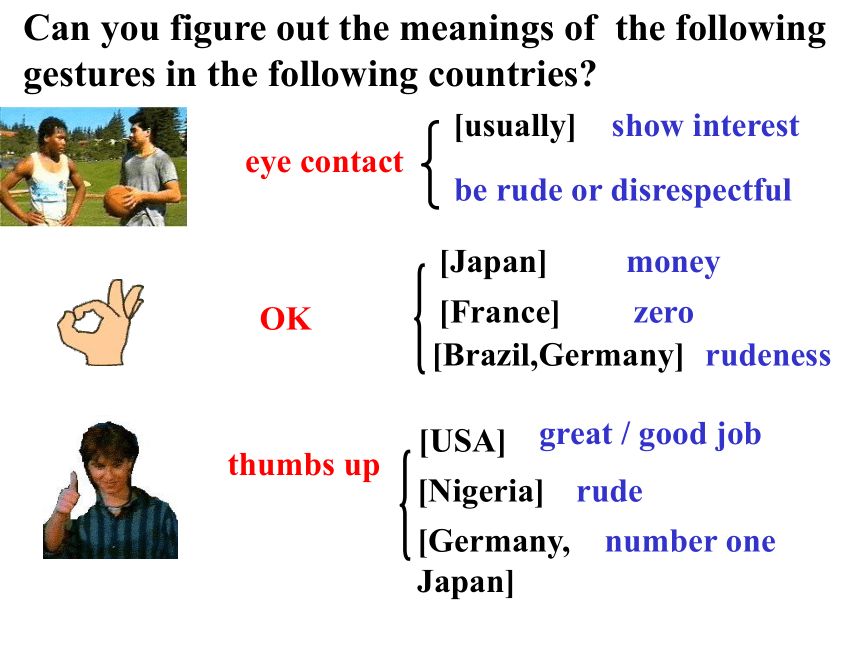
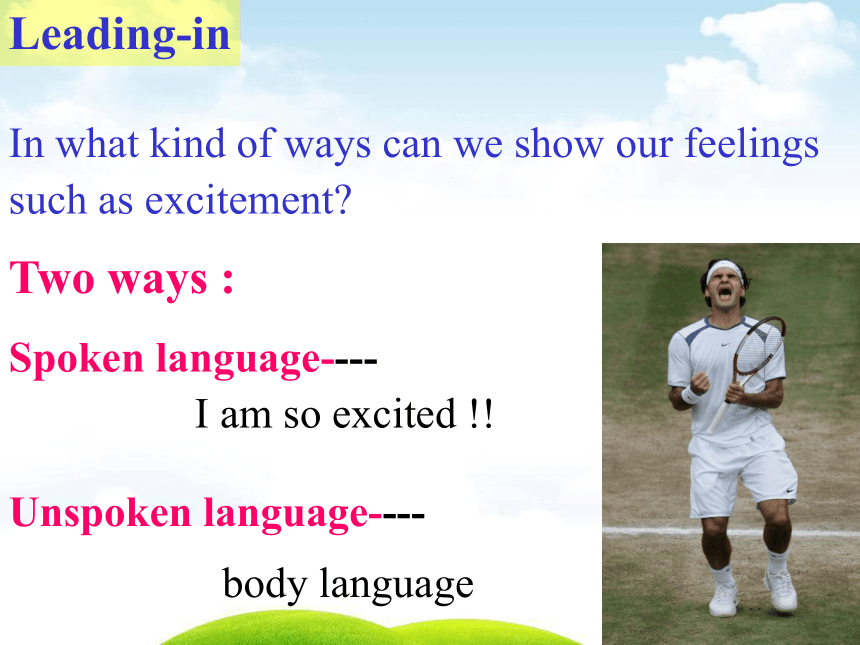
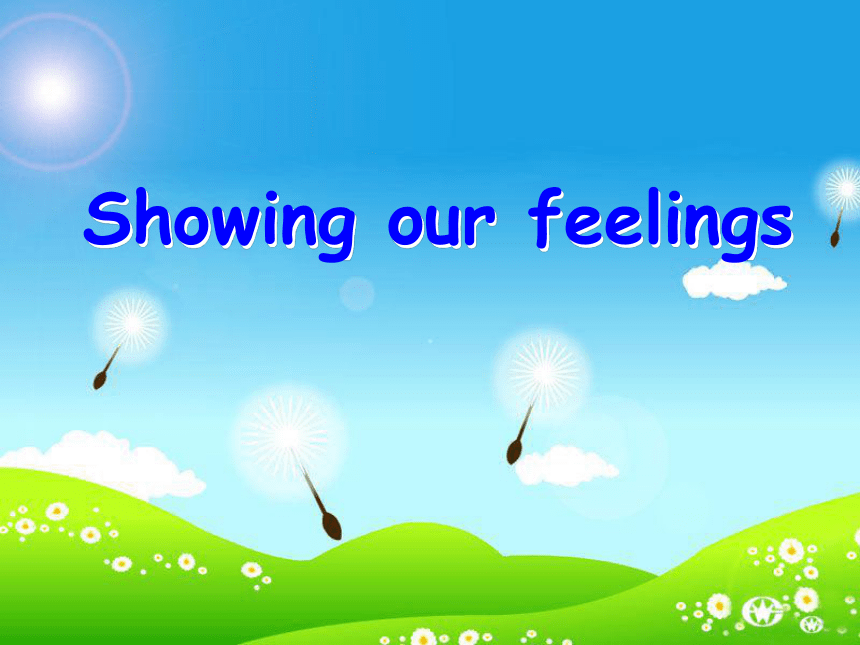
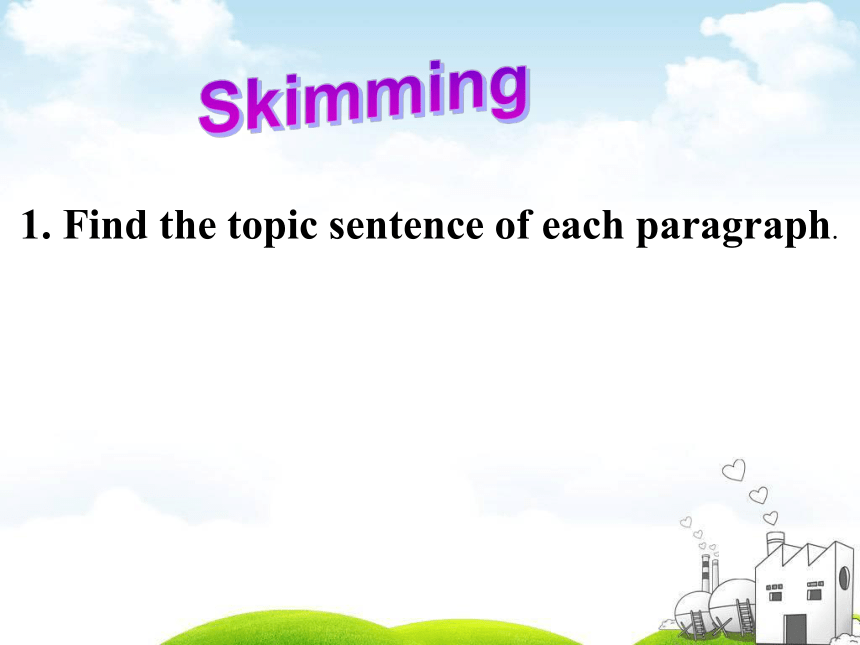
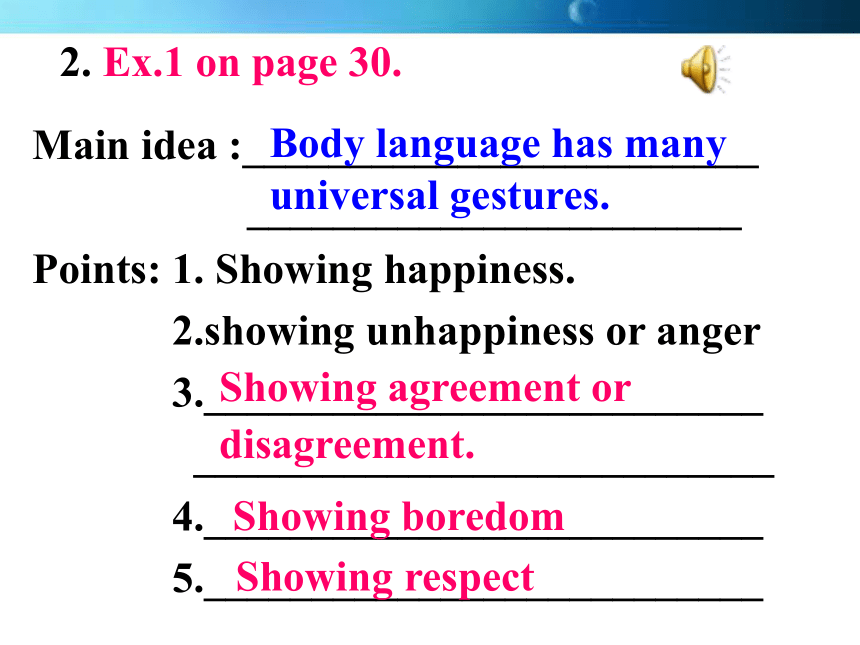
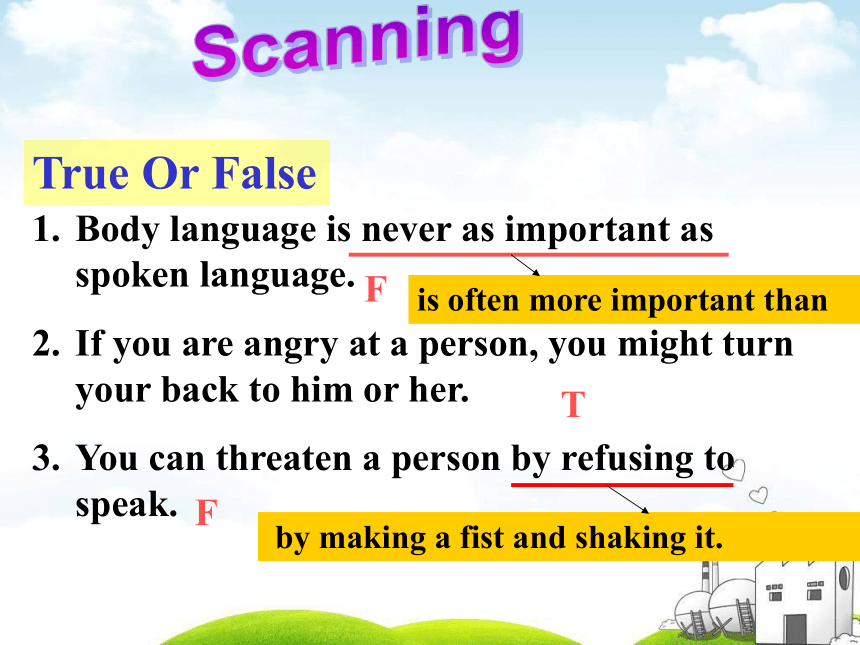
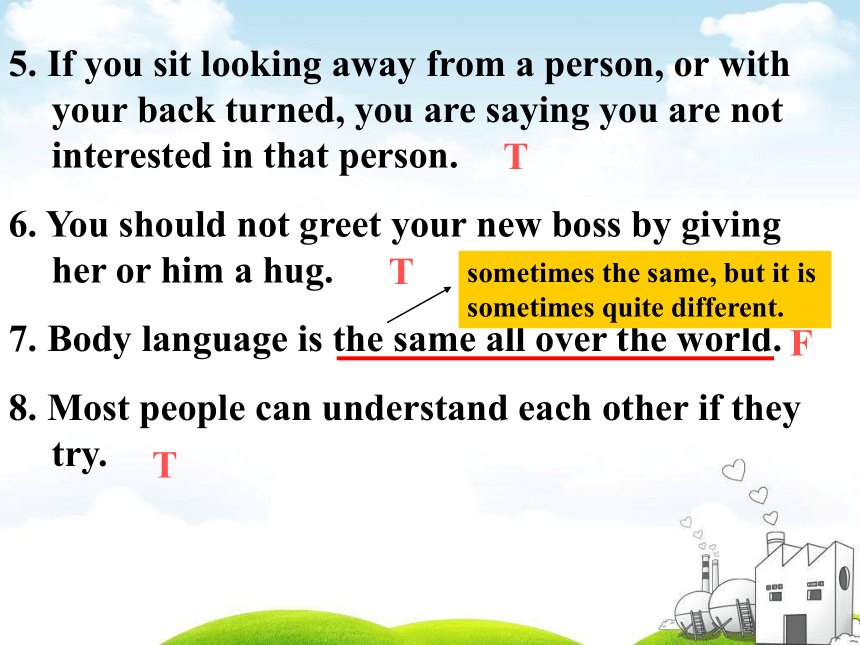
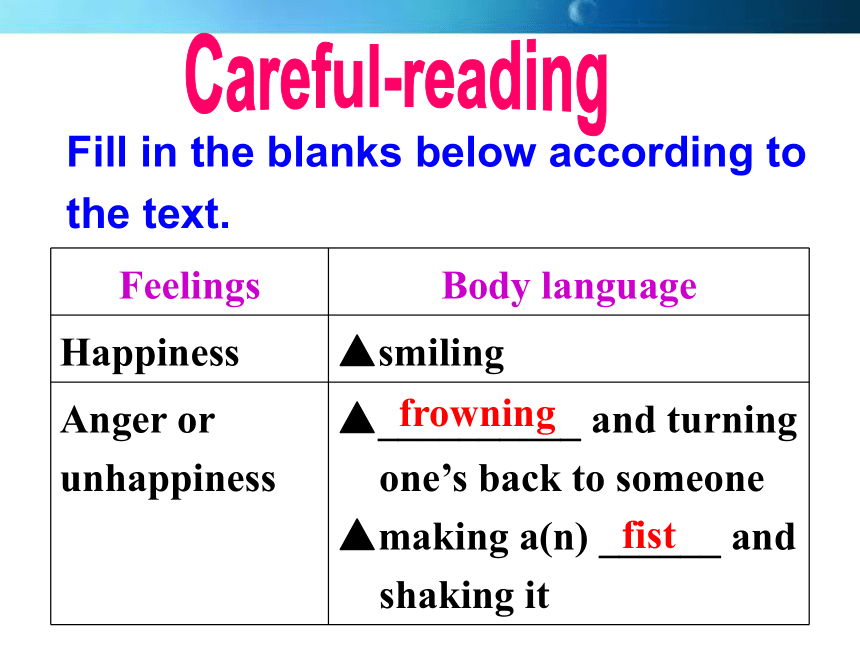
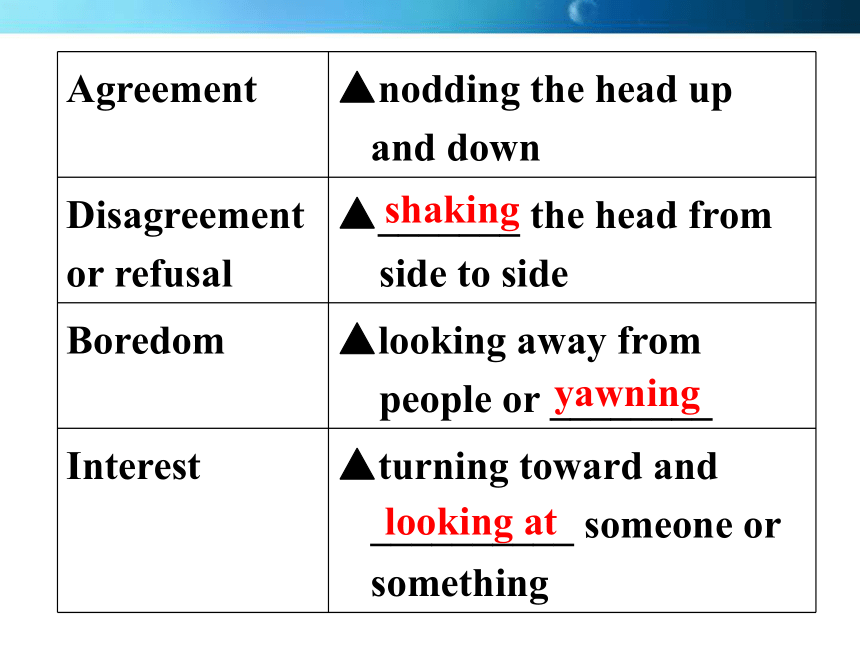
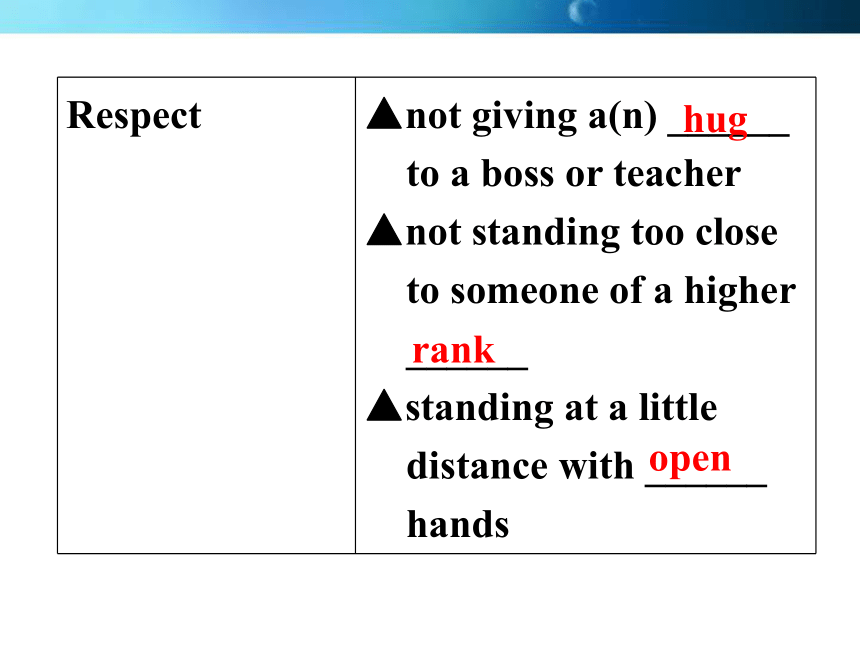
文档简介
Go on enjoying some body languages.
show interest
be rude or disrespectful
money
zero
rudeness
[USA]
[Nigeria]
[Germany,
Japan]
OK
eye contact
thumbs up
Can you figure out the meanings of the following gestures in the following countries?
number one
rude
great / good job
[Brazil,Germany]
[France]
[Japan]
[usually]
Leading-in
In what kind of ways can we show our feelings such as excitement?
Two ways :
Spoken language----
Unspoken language----
I am so excited !!
body language
Showing our feelings
1. Find the topic sentence of each paragraph.
2. Ex.1 on page 30.
Main idea :________________________
_______________________
Points: 1. Showing happiness.
2.showing unhappiness or anger
3.__________________________
___________________________
4.__________________________
5.__________________________
Body language has many
universal gestures.
Showing agreement or
disagreement.
Showing boredom
Showing respect
Body language is never as important as spoken language.
If you are angry at a person, you might turn your back to him or her.
You can threaten a person by refusing to speak.
F
is often more important than
T
F
by making a fist and shaking it.
True Or False
5. If you sit looking away from a person, or with your back turned, you are saying you are not interested in that person.
6. You should not greet your new boss by giving her or him a hug.
7. Body language is the same all over the world.
8. Most people can understand each other if they try.
T
T
F
sometimes the same, but it is sometimes quite different.
T
Fill in the blanks below according to the text.
▲__________ and turning one’s back to someone
▲making a(n) ______ and shaking it
Anger or unhappiness
▲smiling
Happiness
Body language
Feelings
frowning
fist
▲turning toward and __________ someone or something
Interest
▲looking away from people or ________
Boredom
▲_______ the head from side to side
Disagreement or refusal
▲nodding the head up and down
Agreement
shaking
yawning
looking at
▲not giving a(n) ______ to a boss or teacher
▲not standing too close to someone of a higher ______
▲standing at a little distance with ______ hands
Respect
hug
rank
open
1. How can we know other’s feelings,
even if they do not speak to us?
We can watch the expressions on people’s faces; we can see whether they face us or look away; we can observe how they hold their arms and hands;
Use what you have read in the passage and answer the following questions.
we can see whether they are close to or far away from others. Are they smiling, frowning, shrugging, holding their arms in front of them or touching other people?
2. Why should we be careful with our
body language?
We should be careful of our own body language, as we must be sure not to be impolite in other cultures, and we need to communicate without being misunderstood.
3. Why is it important to watch as well as
listen to others?
We need to watch other people because they may be communicating one idea in words and a different one in body language.
4. What are some jobs in which using
body language is extremely important?
Body language is very important in any job where clear communication with others is necessary. For example, teachers and medical care people should have good clear body language; anyone who is interviewing people for jobs
(and the people being interviewed) should communicate clearly; anyone giving orders or directions needs good body language; people working in diplomatic jobs and in some government jobs.
smile
Universal gestures
A smile does not always mean that one is happy.
A smile can hide other feelings, such as anger, fear or worry.
If someone “loses face” they may smile to hide it.
A smile usually intends to put people at ease.
1. It is possible to “read” others around us, even if they do not intend for us to catch their unspoken communication. 我们可以了解别人, 即使有时他们并不想要我们了解他们没说出来的语言。
▲ even if
even if是连词词组, 用来引导
让步状语从句, 意为 “尽管; 即使”。
注意: 若主句与从句皆表示将来情况,
even if从句可用一般现在时代替将来
时。
① We have decided to visit the Museum even if it rains tomorrow. 我们决定明天参观博物馆, 即使天下雨。
② Even if I leave now, it’ll be too late.
即使我现在离开, 我也会迟到的。
③ She understood what I was talking about, even though it was the first time we had spoken together.
即使那是我们第一次谈话,她还是明
白了我在谈什么。
辨析: even if 与even though
even if 从句所说的不肯定, 而 even
though 从句所说的则是事实。
④ He will not let out the secret even if he knows it. 即使他知道这个秘密, 他也不肯说出来。(他对秘密知道与否不一定)
⑤ He will not let out the secret even though he knows it. 他虽然知道这个秘密, 却不肯说出来。(他知道这个秘密)
2. Looking away from people or yawning will, in most cases, make me appear to be uninterested.
如果把眼光从某人身上移开, 或者打了个哈欠, 这就会让人知道我不感兴趣。
▲ look away from
= not look at … 不看, 不注视
① Don’t look away from me when I’m speaking to you. 当我和你说话时看着我, 不要看别处。
[开放思想]
look at 看; 视为
look back 回头看; 回顾
look down on/upon 轻视, 瞧不起
look for 寻找
look forward to 盼望
look into 调查
look out 小心
look on 旁观
look over 仔细检查
look through 浏览
look up 仰视; 在词典, 参考中查找
② Just look at what you’ve done! 瞧你干了些什么!
③ The old like looking back on the past. 老年人喜欢回顾过去。
④ I wish you wouldn’t look down upon/on this kind of work. 我希望你不要看不起这类工作。
⑤ We are looking forward to seeing you again. 我们盼望再见到你。
⑥ The police are looking into the accident. 警察正在调查这件事。
⑦ In that case we will not look on with folded arms. 在那种情况下, 我们不会袖手旁观。
▲ yawn
(1) v. 打呵欠
e.g. She yawned during the lecture
because it was boring.
她听课时打哈欠, 因为这堂课很乏味。
(2) n. 哈欠
e.g. He gave a yawn and then fell asleep.
他打了一个哈欠之后就睡着了。
3. If I roll my eyes and turn my head
away, I most likely do not believe what
I am hearing or do not like it.
most likely在这里是省略: it is most likely that。
用括号内所给单词的适当形式填空。
1. The importance of his ideas is that they represent the ________ (spoken) opinion of the silent majority.
2. His _____ (face) expression shows he is angry now.
3. He stood up, stretched and _______ (yawn).
4. He took a _________ (subject) view of the problem.
unspoken
facial
yawned
subjective
Look at the following pictures, can you guess the correct order of the pictures below? Write your guesses. Then listen to the tape and write down the correct order.
Answer: 2 1 3 4 6 5
Listen again and then answer the questions.
1. From whom did Lin Pu buy the car?
2. What did the cyclist tell LinPu to do?
From his brother-in-law.
To pay for his apples. At least Lin Pu should pick the apples up.
3. What did the policeman tell LinPu
to do?
To pay a fine by the end of the month for breaking the traffic rule.
Work in groups of three and use some verb phrases or sentences to describe each picture. Be prepared to act it out using spoken language as well as body language. The following words may help you.
You may not... Always stay...
Keep away from... Do not...
You should never... Look out!
You must... Watch out!
You will need to ... Be careful when…
You’ll have to… You’ll be fined 200 yuan
the brother-in-law smiling very happily and rubbing his hands with joy.
bought a car from his brother-in-law
Lin Pu and his brother-in-law
Money changing hands,
smiling faces,
shaking hands,
driving nervously for the first time
reacting to crash.
Lin Pu
Nervously looking around
reacting to traffic,
sudden left turn,
Lin Pu hit a bicycle.
Lin Pu knocked over a basket full of apples.
Lin Pu and a cyclist
The cyclist
My hand hurt.
Come here.
shaking his fist (closed hand) at Lin Pu ,
Lin Pu, the cyclist and a policeman
angry, shouting
pointing at bicycle,
pointing at apples on road,
Lin Pu and the cyclist quarreled, and a policeman walked towards them.
Lin Pu, the cyclist and the policeman
Walking slowly and frowning,
Taking out paper to write on,
Shaking finger at Lin Pu,
The police made Lin Pu pay the fine.
Pointing at red light,
Pointing at traffic lanes,
Shaking his head
show interest
be rude or disrespectful
money
zero
rudeness
[USA]
[Nigeria]
[Germany,
Japan]
OK
eye contact
thumbs up
Can you figure out the meanings of the following gestures in the following countries?
number one
rude
great / good job
[Brazil,Germany]
[France]
[Japan]
[usually]
Leading-in
In what kind of ways can we show our feelings such as excitement?
Two ways :
Spoken language----
Unspoken language----
I am so excited !!
body language
Showing our feelings
1. Find the topic sentence of each paragraph.
2. Ex.1 on page 30.
Main idea :________________________
_______________________
Points: 1. Showing happiness.
2.showing unhappiness or anger
3.__________________________
___________________________
4.__________________________
5.__________________________
Body language has many
universal gestures.
Showing agreement or
disagreement.
Showing boredom
Showing respect
Body language is never as important as spoken language.
If you are angry at a person, you might turn your back to him or her.
You can threaten a person by refusing to speak.
F
is often more important than
T
F
by making a fist and shaking it.
True Or False
5. If you sit looking away from a person, or with your back turned, you are saying you are not interested in that person.
6. You should not greet your new boss by giving her or him a hug.
7. Body language is the same all over the world.
8. Most people can understand each other if they try.
T
T
F
sometimes the same, but it is sometimes quite different.
T
Fill in the blanks below according to the text.
▲__________ and turning one’s back to someone
▲making a(n) ______ and shaking it
Anger or unhappiness
▲smiling
Happiness
Body language
Feelings
frowning
fist
▲turning toward and __________ someone or something
Interest
▲looking away from people or ________
Boredom
▲_______ the head from side to side
Disagreement or refusal
▲nodding the head up and down
Agreement
shaking
yawning
looking at
▲not giving a(n) ______ to a boss or teacher
▲not standing too close to someone of a higher ______
▲standing at a little distance with ______ hands
Respect
hug
rank
open
1. How can we know other’s feelings,
even if they do not speak to us?
We can watch the expressions on people’s faces; we can see whether they face us or look away; we can observe how they hold their arms and hands;
Use what you have read in the passage and answer the following questions.
we can see whether they are close to or far away from others. Are they smiling, frowning, shrugging, holding their arms in front of them or touching other people?
2. Why should we be careful with our
body language?
We should be careful of our own body language, as we must be sure not to be impolite in other cultures, and we need to communicate without being misunderstood.
3. Why is it important to watch as well as
listen to others?
We need to watch other people because they may be communicating one idea in words and a different one in body language.
4. What are some jobs in which using
body language is extremely important?
Body language is very important in any job where clear communication with others is necessary. For example, teachers and medical care people should have good clear body language; anyone who is interviewing people for jobs
(and the people being interviewed) should communicate clearly; anyone giving orders or directions needs good body language; people working in diplomatic jobs and in some government jobs.
smile
Universal gestures
A smile does not always mean that one is happy.
A smile can hide other feelings, such as anger, fear or worry.
If someone “loses face” they may smile to hide it.
A smile usually intends to put people at ease.
1. It is possible to “read” others around us, even if they do not intend for us to catch their unspoken communication. 我们可以了解别人, 即使有时他们并不想要我们了解他们没说出来的语言。
▲ even if
even if是连词词组, 用来引导
让步状语从句, 意为 “尽管; 即使”。
注意: 若主句与从句皆表示将来情况,
even if从句可用一般现在时代替将来
时。
① We have decided to visit the Museum even if it rains tomorrow. 我们决定明天参观博物馆, 即使天下雨。
② Even if I leave now, it’ll be too late.
即使我现在离开, 我也会迟到的。
③ She understood what I was talking about, even though it was the first time we had spoken together.
即使那是我们第一次谈话,她还是明
白了我在谈什么。
辨析: even if 与even though
even if 从句所说的不肯定, 而 even
though 从句所说的则是事实。
④ He will not let out the secret even if he knows it. 即使他知道这个秘密, 他也不肯说出来。(他对秘密知道与否不一定)
⑤ He will not let out the secret even though he knows it. 他虽然知道这个秘密, 却不肯说出来。(他知道这个秘密)
2. Looking away from people or yawning will, in most cases, make me appear to be uninterested.
如果把眼光从某人身上移开, 或者打了个哈欠, 这就会让人知道我不感兴趣。
▲ look away from
= not look at … 不看, 不注视
① Don’t look away from me when I’m speaking to you. 当我和你说话时看着我, 不要看别处。
[开放思想]
look at 看; 视为
look back 回头看; 回顾
look down on/upon 轻视, 瞧不起
look for 寻找
look forward to 盼望
look into 调查
look out 小心
look on 旁观
look over 仔细检查
look through 浏览
look up 仰视; 在词典, 参考中查找
② Just look at what you’ve done! 瞧你干了些什么!
③ The old like looking back on the past. 老年人喜欢回顾过去。
④ I wish you wouldn’t look down upon/on this kind of work. 我希望你不要看不起这类工作。
⑤ We are looking forward to seeing you again. 我们盼望再见到你。
⑥ The police are looking into the accident. 警察正在调查这件事。
⑦ In that case we will not look on with folded arms. 在那种情况下, 我们不会袖手旁观。
▲ yawn
(1) v. 打呵欠
e.g. She yawned during the lecture
because it was boring.
她听课时打哈欠, 因为这堂课很乏味。
(2) n. 哈欠
e.g. He gave a yawn and then fell asleep.
他打了一个哈欠之后就睡着了。
3. If I roll my eyes and turn my head
away, I most likely do not believe what
I am hearing or do not like it.
most likely在这里是省略: it is most likely that。
用括号内所给单词的适当形式填空。
1. The importance of his ideas is that they represent the ________ (spoken) opinion of the silent majority.
2. His _____ (face) expression shows he is angry now.
3. He stood up, stretched and _______ (yawn).
4. He took a _________ (subject) view of the problem.
unspoken
facial
yawned
subjective
Look at the following pictures, can you guess the correct order of the pictures below? Write your guesses. Then listen to the tape and write down the correct order.
Answer: 2 1 3 4 6 5
Listen again and then answer the questions.
1. From whom did Lin Pu buy the car?
2. What did the cyclist tell LinPu to do?
From his brother-in-law.
To pay for his apples. At least Lin Pu should pick the apples up.
3. What did the policeman tell LinPu
to do?
To pay a fine by the end of the month for breaking the traffic rule.
Work in groups of three and use some verb phrases or sentences to describe each picture. Be prepared to act it out using spoken language as well as body language. The following words may help you.
You may not... Always stay...
Keep away from... Do not...
You should never... Look out!
You must... Watch out!
You will need to ... Be careful when…
You’ll have to… You’ll be fined 200 yuan
the brother-in-law smiling very happily and rubbing his hands with joy.
bought a car from his brother-in-law
Lin Pu and his brother-in-law
Money changing hands,
smiling faces,
shaking hands,
driving nervously for the first time
reacting to crash.
Lin Pu
Nervously looking around
reacting to traffic,
sudden left turn,
Lin Pu hit a bicycle.
Lin Pu knocked over a basket full of apples.
Lin Pu and a cyclist
The cyclist
My hand hurt.
Come here.
shaking his fist (closed hand) at Lin Pu ,
Lin Pu, the cyclist and a policeman
angry, shouting
pointing at bicycle,
pointing at apples on road,
Lin Pu and the cyclist quarreled, and a policeman walked towards them.
Lin Pu, the cyclist and the policeman
Walking slowly and frowning,
Taking out paper to write on,
Shaking finger at Lin Pu,
The police made Lin Pu pay the fine.
Pointing at red light,
Pointing at traffic lanes,
Shaking his head
同课章节目录
